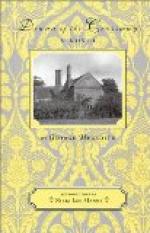Hearing from Mr. Rhodes that he had walked the distance from town, and had been to Copsley, Lady Dunstane invited him to follow the pony-carriage thither, where he was fed and refreshed by a tea-breakfast, as he preferred walking on tea, he said. ’I took the liberty to call at Mrs. Warwick’s house,’ he informed her; ’the footman said she was at Copsley. I found it on the map—I knew the directions—and started about two in the morning. I wanted a walk.’
It was evident to her that he was one of the young squires bewitched whom beautiful women are constantly enlisting. There was no concealment of it, though he stirred a sad enviousness in the invalid lady by descanting on the raptures of a walk out of London in the youngest light of day, and on the common objects he had noticed along the roadside, and through the woods, more sustaining, closer with nature than her compulsory feeding on the cream of things.
‘You are not fatigued?’ she inquired, hoping for that confession at least; but she pardoned his boyish vaunting to walk the distance back without any fatigue at all.
He had a sweeter reward for his pains; and if the business of the chronicler allowed him to become attached to pure throbbing felicity wherever it is encountered, he might be diverted by the blissful unexpectedness of good fortune befalling Mr. Arthur Rhodes in having the honour to conduct Mrs. Warwick to town. No imagined happiness, even in the heart of a young man of two and twenty, could have matched it. He was by her side, hearing and seeing her, not less than four hours. To add to his happiness, Lady Dunstane said she would be glad to welcome him again. She thought him a pleasant specimen of the self-vowed squire.
Diana was sure that there would be a communication for her of some sort at her house in London; perhaps a message of farewell from the dying lord, now dead. Mr. Rhodes had only the news of the evening journals, to the effect that Lord Dannisburgh had expired at his residence, the Priory, Hallowmere, in Hampshire. A message of farewell from him, she hoped for: knowing him as she did, it seemed a certainty; and she hungered for that last gleam of life in her friend. She had no anticipation of the burden of the message awaiting her.
A consultation as to the despatching of the message, had taken place among the members of Lord Dannisburgh’s family present at his death. Percy Dacier was one of them, and he settled the disputed point, after some time had been spent in persuading his father to take the plain view of obligation in the matter, and in opposing the dowager countess, his grandmother, by stating that he had already sent a special messenger to London. Lord Dannisburgh on his death-bed had expressed a wish that Mrs. Warwick would sit with him for an hour one night before the nails were knocked in his coffin. He spoke of it twice, putting it the second time to Percy as a formal request to be made to her, and Percy had promised him that Mrs. Warwick should have the message. He had done his best to keep his pledge, aware of the disrelish of the whole family for the lady’s name, to say nothing of her presence.




